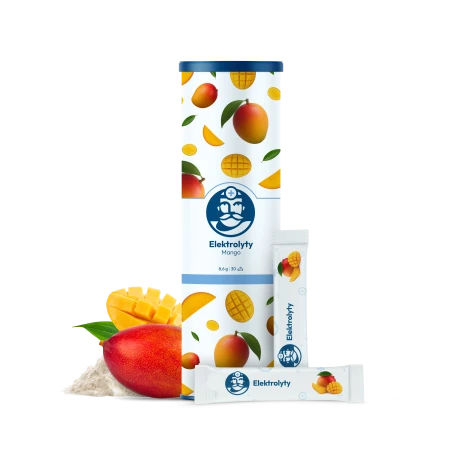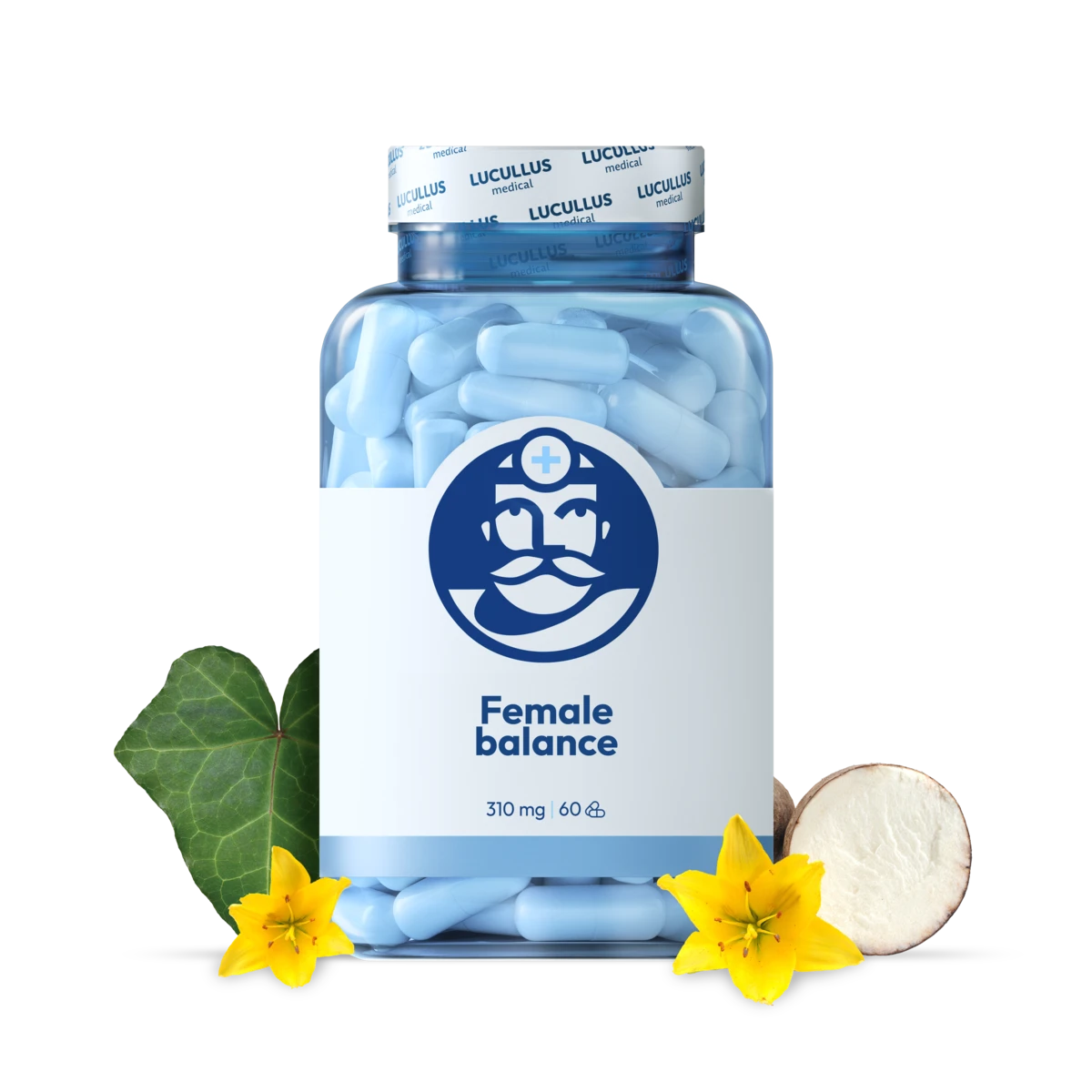Περιγραφή
Αρμονία και φυσική άνεση καθ' όλη τη διάρκεια του μήνα με το συμπλήρωμα Γυναικεία ισορροπία
Ο γυναικείος οργανισμός αντιδρά στις διακυμάνσεις με μεγαλύτερη ευαισθησία από ό,τι φαίνεται – είτε πρόκειται για τον εμμηνορροϊκό κύκλο, την εμμηνόπαυση, τη μετεμμηνοπαυσιακή περίοδο ή περιόδους αυξημένου στρες. Ο ακανόνιστος κύκλος, η ένταση ή οι αλλαγές στη διάθεση μπορούν να επηρεάσουν την καθημερινή λειτουργία και τη ζωτικότητα. Γυναικεία ισορροπία είναι ένα συμπλήρωμα διατροφής που έχει δημιουργηθεί για να υποστηρίζει την εσωτερική αρμονική σταθερότητα και τη φυσική γυναικεία άνεση στην καθημερινή ζωή.
Βασικά οφέλη
- Αρμονική γυναικεία άνεση – το εκχύλισμα Dioscorea villosa συμπληρώνει την καθημερινή φροντίδα του γυναικείου σώματος. Υποστηρίζει την ευχάριστη σωματική κατάσταση και διευκολύνει την αντιμετώπιση των περιόδων που είναι ευαίσθητες στις ορμονικές αλλαγές.
- Πιο ήρεμη διάθεση και συναισθηματική ισορροπία – τα φυτικά συστατικά μετριάζουν τις συναισθηματικές διακυμάνσεις, προάγουν την ηρεμία, τη χαλάρωση και την ευχάριστη ψυχική διάθεση.
- Υποστήριξη της ενέργειας και της ζωτικότητας – τα συστατικά του συμπληρώματος συμβάλλουν στον φυσιολογικό ενεργειακό μεταβολισμό, βοηθώντας στην αποτελεσματικότερη αξιοποίηση της ενέργειας και συμβάλλοντας στην αίσθηση ελαφρότητας και φρεσκάδας κατά τη διάρκεια της ημέρας.
- Ενίσχυση των φυσικών διαδικασιών του σώματος – τα φυτικά εκχυλίσματα υποστηρίζουν με ήπιο τρόπο τις μεταβολικές λειτουργίες, οι οποίες διαδραματίζουν σημαντικό ρόλο στη συνολική φυσιολογική ισορροπία του οργανισμού.
- Ευχάριστη αντιμετώπιση των γυναικείων ημερών – το άγριο γιαμ χρησιμοποιείται παραδοσιακά κατά τη διάρκεια των κυκλικών αλλαγών. Συμβάλλει στη σωματική και συναισθηματική άνεση και βελτιώνει τη συνολική εμπειρία κατά τη διάρκεια των γυναικείων ημερών.
Σύνθεση και δράσεις
- Dioscorea villosa (άγριο γιαμ) – Dioscorea villosa Εκχύλισμα ρίζας, τυποποιημένο σε 20% διοσγενίνη (300 mg εκχυλίσματος). Υποστηρίζει τη γυναικεία άνεση, την κανονικότητα του κύκλου και την ευχάριστη φυσική κατάσταση. Η διοσγενίνη είναι μια φυτική στεροειδής σαπωνίνη που βρίσκεται φυσικά σε αυτό το φυτό και είναι υπεύθυνη για τις λειτουργικές του ιδιότητες.
Γιατί λειτουργεί – επιστημονική αιτιολόγηση
Η Dioscorea villosa είναι μια σημαντική φυτική πηγή διοσγενίνης – μιας βιοδραστικής ουσίας που συνδέεται από καιρό με την υποστήριξη του γυναικείου οργανισμού. Οι σαπωνίνες της δρουν απαλά αλλά αποτελεσματικά: υποστηρίζουν τις μεταβολικές διεργασίες που είναι βασικές για τη ζωτικότητα, την ενέργεια και τη συνολική φυσιολογική ισορροπία. Χάρη σε αυτό, το σώμα μπορεί να είναι καλύτερα προετοιμασμένο να αντιμετωπίσει τις περιόδους των κυκλικών αλλαγών.
Στην παραδοσιακή γυναικεία φυτοθεραπεία, το άγριο γιαμ έχει κερδίσει σταθερή θέση κυρίως για την ικανότητά του να ανακουφίζει από τις δυσάρεστες αισθήσεις που συνδέονται με τον εμμηνορροϊκό κύκλο και να υποστηρίζει την άνεση κατά την περίοδο της εμμηνόπαυσης. Λειτουργεί ως σταθεροποιητικός παράγοντας που βοηθά στην εναρμόνιση της σωματικής και συναισθηματικής κατάστασης της γυναίκας.
Το φυτό περιέχει επίσης συνοδευτικά φυτοχημικά – διοσικίνη, φυτοστερόλες, αμινοξέα, αλκαλοειδή και τανίνες – τα οποία συνεργάζονται φυσικά με τη διοσγενίνη, βελτιστοποιούν τις αντιδράσεις του οργανισμού και υποστηρίζουν τη ρύθμιση των φλεγμονωδών διεργασιών.
Η σύγχρονη επεξεργασία του φυτού επιτρέπει τη διατήρηση των δραστικών ουσιών σε ακριβή και ελεγχόμενη μορφή. Η τυποποίηση σε καθορισμένη ποσότητα διοσγενίνης εγγυάται σταθερή ποιότητα και δράση σε κάθε δόση. Χάρη στον συνδυασμό παραδοσιακών γνώσεων και σύγχρονης εκχύλισης, το Wild Yam αποτελεί αξιόπιστη υποστήριξη για την άνεση, τη μεταβολική ισορροπία και τη γενική ευεξία των γυναικών. Η δράση του είναι φυσική, σταδιακή και ταιριάζει αρμονικά με τον ρυθμό του γυναικείου σώματος.
Συνιστώμενη χρήση και ποιότητα παραγωγής
Λάβετε 1 κάψουλα την ημέρα με το φαγητό και πίνετε αρκετό νερό. Το συμπλήρωμα παράγεται σε ελεγχόμενες συνθήκες, χωρίς αλλεργιογόνα, ΓΤΟ και τεχνητά χρωστικά. Κάθε παρτίδα υποβάλλεται σε εργαστηριακές δοκιμές καθαρότητας και ποιότητας.
Νιώστε ισορροπία, αρμονία και φυσικότητα στο σώμα σας. Χαρίστε στον εαυτό σας την ισορροπία που θα σας θυμίζει κάθε μέρα τη δύναμη και την μοναδικότητα του γυναικείου οργανισμού.
V naturálnom doplnku je ukrytá menej známa rastlina diskórea huňatá ( Discorea villosa, Wild yam) z čeľade Dioscoreaceae. Poďme sa s ňou zoznámiť ☺ Existuje viac ako 600 druhov rastlín yam, najvýraznejší druh je divoký yam (Dioscorea villosa). Táto trvá nenáročná liana (vinič) rovníkových oblastí, má listy v tvare srdca. V listoch a koreňoch je prítomný diosgenín (primárna zložka), práve koreň sa používa v medicíne aj v našich doplnkoch, ako koncentrovaný extrakt (najvyššia výťažnosť), štruktúra je podobný cholesterol. Táto látka sa používala na výrobu prvých antikoncepčných podkladov.
Zobraziť viac






























